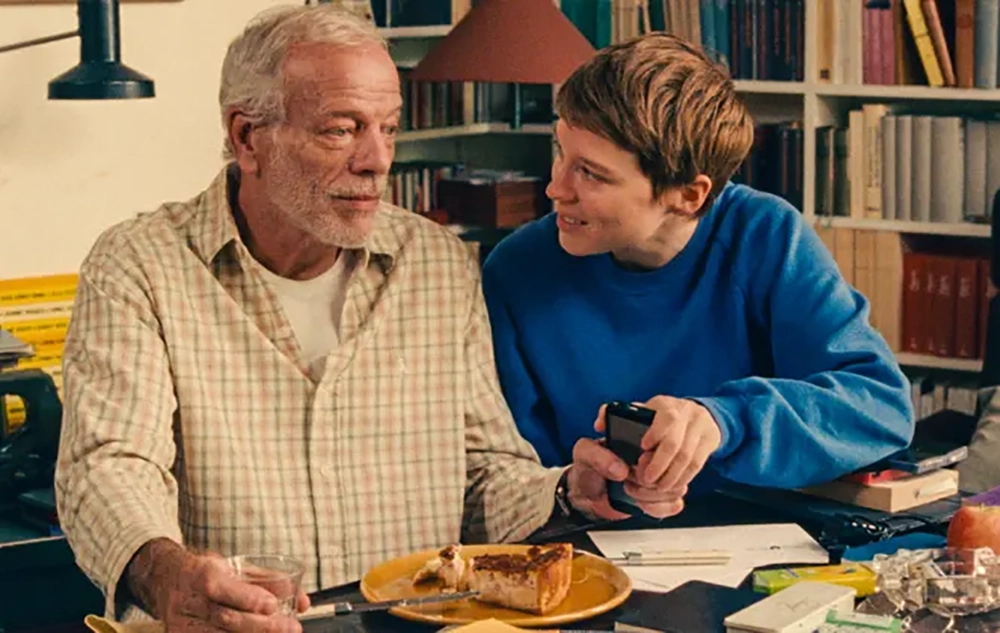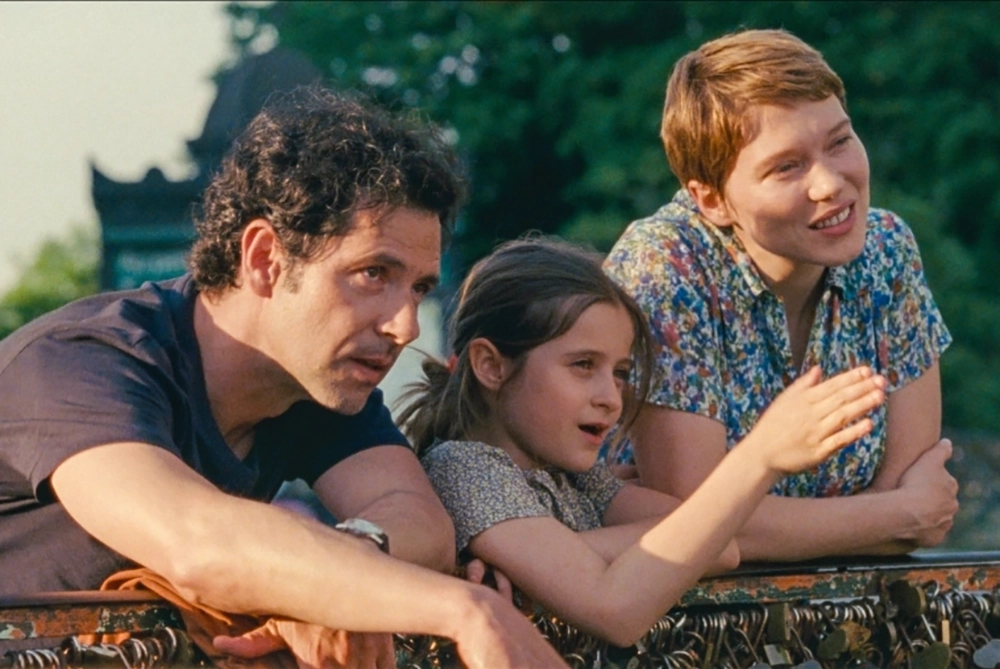Doris Day’s “Que Sera, Sera” plays at the beginning and end of “Father of My Children” (2009), Mia Hansen-Løve’s second feature, which examines a family coping with a life-changing crisis. In the intimate and intricate “One Fine Morning,” Hansen-Løve explores similar terrain, telling a story of Sandra (Léa Seydoux), a single mother managing her personal and professional life while overseeing the decline of her father Georg (Pascal Greggory), who’s suffering from a rare neurological disorder. It’s a heartbreaking film, at once life affirming and wholly realistic about how impossible life’s obstacles can feel. Just as Day sang, “whatever will be, will be,” Hansen-Løve’s gift is that she posits no facile solutions, arguing only in favor of those finest pleasures—art, sex, love—to counter the incessant stress of fighting for yourself while putting others first.
It often seems that you can group all of Hansen-Løve’s films together as one, or even match them as duos or parts of a trilogy. She’s a consummate auteur, expressing her worldview through films, but never in a manner that’s prescriptive. The films consider thorny, universal issues—divorce, illness, artistic conflict—yet ask the characters and viewers to somehow embrace the chaos or at least, to get comfortable with change. As the sole credited writer of all the films she directs (besides “Eden” in 2014, a film based on her brother, with whom she shares screenplay credit) Hansen-Løve exerts her creative control with a delicate hand, understanding—as Doris Day suggested—that few people are lucky enough to have control over the process which governs their lives.
An Intimate Portrait of Private Lives
Sandra opens the film at Georg’s apartment, listening rather than talking. They’re surrounded by his things, books that he’s accumulated after a lifetime in academia, objects that, according to Sandra, are more him than he is right now. Georg was diagnosed with Benson’s syndrome, and will soon be forced to move out of his home to be under the constant care of nurses and doctors. Sandra’s mom and Georg’s ex-wife Francois (Nicole Garcia, who is flawless, a shining light among many others) take the lead in finding a place for him, not accounting for the fact that these overburdened institutions don’t always have room for someone in Georg’s condition. A lesser movie might turn this into a screed on the state of the healthcare system, but Hansen-Løve’s material easily resists that urge, allowing the whole family (Georg included) to have their own lives outside of the medical care system.
And it’s a great pleasure that the film takes its time introducing the private lives of these scrappy, complex characters. Sandra begins an affair with Clement (Melvil Poupaud), a married man with a son who’s friends with Sandra’s daughter. Francois, a dynamite, disorienting presence, spends her days protesting and occasionally, in protective custody as a result of that protesting. Poor Georg has his pleasures, too: his family visits, socializing with fellow patients, and his companion Leila, who can’t take him in because of her own health issues. It’s Sandra who’s on the screen for nearly the entire film, and Seydoux is up to the task. It’s an intense, rewarding collaboration between director and actress that ensures Sandra isn’t just a single mother caring for her dying father. She’s many things, and doesn’t stop wanting or going after what satisfies her.
A Showcase for Léa Seydoux
What Sandra needs doesn’t necessarily change over the course of the film, it’s just that life around her becomes more difficult. Clement says he loves her, then leaves her, then returns. Georg’s health deteriorates so he’s moved to a care facility much further away. And, in a light touch that’s just perfect: Sandra’s daughter Linn (Camille Leban Martins) starts to limp, prompting Sandra to take her to a doctor who discovers that she’s faking it. Presumably, Linn sees how much attention Georg warrants given his physical struggles, so can’t blame her for trying this. Everyone who demands something of Sandra gives something in return, of course, but the balance is off. Sandra, a steely, precise person, is tested so often that she begins to slip up at work, distracted so much by a text from Clement that she can’t keep up with the speech that she was responsible for translating.

Precision might mark the lives of the characters—Sandra, Francois and Georg especially—but it’s rarely an attribute of Hansen-Løve’s cinematic style. The action might lull, people might speak in extended monologues, doses of humor might overstay their welcome. But that’s true to life, and to the messages this art conveys. The messy nature of relationships, working creatively and just trying to make it through the day are primary concerns of Sandra here, Chris (Vicky Krieps) in “Bergman Island” (2021), Nathalie (Isabelle Huppert) in “Things to Come” (2016), and Hansen-Løve doesn’t reduce any of them to her biggest life disappointments or successes. Each protagonist is on her own journey, and Hansen-Løve doesn’t chastise them for any decision, small or large. It’s a judgment-free zone.
A Profound, Moving Film
With these last two films (“Bergman Island” was her latest triumph), Hansen-Løve has both revisited old topics and refined the storytelling approach. She tests our patience only because the material on the screen is so challenging and relatable. And while Ingmar Bergman is clearly a North Star for her (Sandra’s daughter is named Linn, the Norwegian writer Linn Ullman is Liv Ullman and Bergman’s daughter), Hansen-Løve follows the footsteps of Yasujiro Ozu and Eric Rohmer, both in terms of their preoccupations (generational conflict, family troubles, romantic longing) and pacing. The camera’s largely stagnant, the people love to talk. Similar to Ozu and Rohmer, Hansen-Løve doesn’t have it in her to make a “commercial” movie. She’s stubbornly refusing to ignore the stories that matter to her, and “One Fine Morning” is a profound, moving film, one which appears quiet on the surface but announces its ambition loudly, without apology or explanation.
“One Fine Morning” is part of our continuing coverage of the 2022 New York Film Festival (NYFF).
Support the Site: Consider becoming a sponsor to unlock exclusive, member-only content and help support The Movie Buff!


